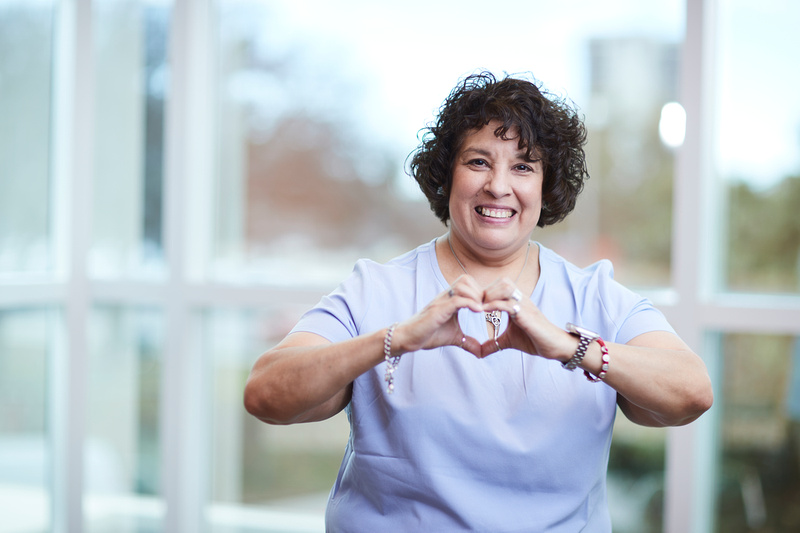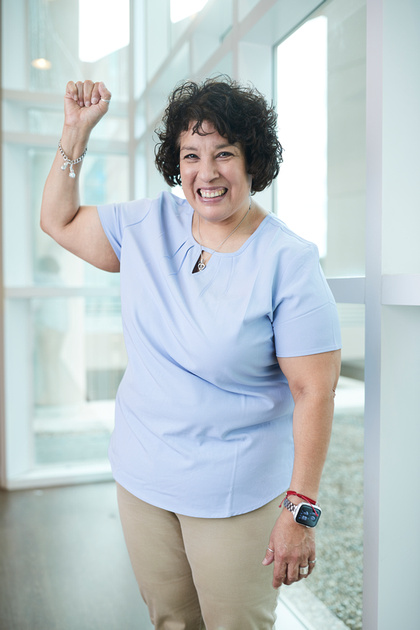Cancer Warrior: Yvonne Martinez beat breast cancer with self-determination


— Yvonne Martinez, Triple-negative breast cancer survivor
Before she was diagnosed with breast cancer, Yvonne Martinez worked as a patient registration supervisor at a New Braunfels, Texas, hospital. Martinez was proud that she had worked most of her adult life and did not have to depend on anyone for financial security as she raised her three sons.
Her life changed dramatically when COVID-19 spread throughout the U.S. in 2020. With the economy in turmoil, she was laid off from her job that August. Then, the unthinkable happened. In April 2021, Martinez noticed a lump in her right breast. Without health insurance, she knew she needed to be resourceful and seek treatment immediately.
Martinez began her cancer journey at a San Antonio health clinic where she once worked. While she was able to get a mammogram, the clinic did not give her the results. A few weeks later, she learned over the phone that she had cancer but was not given information about who would be her doctor. In May, she poured out her anxieties to her endocrinologist, who worked in a different medical practice.
“She found out I had stage 2 triple-negative breast cancer. She said, ‘I know a doctor at the Mays Cancer Center you should see. I’ll email her to set up an appointment,’” said Martinez. In June 2021, Martinez had her first appointment with Kate Lathrop, MD, a Mays Cancer Center breast oncologist. Three days later, Martinez began chemotherapy.
Prompt treatment for an aggressive cancer
“Mrs. Martinez had cancer in her breast that had spread to her axillary lymph nodes,” Lathrop explained. “The type of breast cancer was triple-negative breast cancer, which means that the cancer cells do not have receptors that recognize the hormones estrogen or progesterone. Triple-negative breast cancer also lacks the protein called HER2. Because triple-negative breast cancer lacks these receptors, chemotherapy is the primary treatment.”
Triple-negative breast cancer has a higher prevalence among younger women and in Hispanic and Black women compared to non-Hispanic white patients.
“Mrs. Martinez received the most updated, evidence-based treatment for her specific diagnosis,” Lathrop said, which included a combination of four chemotherapy drugs given in conjunction with immunotherapy. This was followed by surgery to remove the tumor in the breast, with assessment of the axillary lymph nodes, and then radiation.
But the financial stress of paying for treatment began to overwhelm Martinez.
“I’ve always been so independent. I raised all three of my boys by myself,” said Martinez. Her fiancé, Daniel, told her, “This is your turn to lean on someone else.”
Learning to lean on her care team
Martinez was referred to Mays Cancer Center psychologist Jeslina Raj, PsyD, who met with Martinez 14 times.
“Mrs. Martinez was struggling to initially accept her diagnosis and later the treatment and its side effects, and the financial constraints resulting from her being unable to work,” she said. With Raj’s encouragement, Martinez made finding financial assistance her next goal. The Mays Cancer Center’s Patient and Family Services social worker Carol Sherman, LCSW, helped her apply for financial assistance through several organizations.
“Then I found some resources on my own. I ended up calling the social worker back with those resources that she could use for somebody else,” Martinez said.
During her treatment, Martinez worked from home registering patients for another health care company but had to give that up when she developed an infection in her breast that required several weeks of rehabilitation from Brian Fricke, MD, director of cancer rehabilitation, and surgery performed by Federico Tozzi, MD, surgical oncologist — both on her Mays Cancer Center care team.
Keeping her faith
After completing six months of triple-negative breast cancer treatment, Martinez received a triple reward. At the time of her surgery, Martinez’s tests showed that no active cancer cells remained in her breast or lymph nodes, meaning that she did not require any additional chemotherapy after surgery. She continues her regular follow-up care with Lathrop to monitor for recurrence. In February 2022, Martinez married Daniel. Her third reward is being employed full time from home as a patient registration clerk.
“I am so thankful,” she said. Now, Martinez can share her recommendations for others on their cancer journey.
“Keep your faith. Keep that inspiration going,” said Martinez. “There are resources out there.”
Learn more about out Breast Cancer Program.
Read more stories from our 2022 Annual Report.

 Close
Close